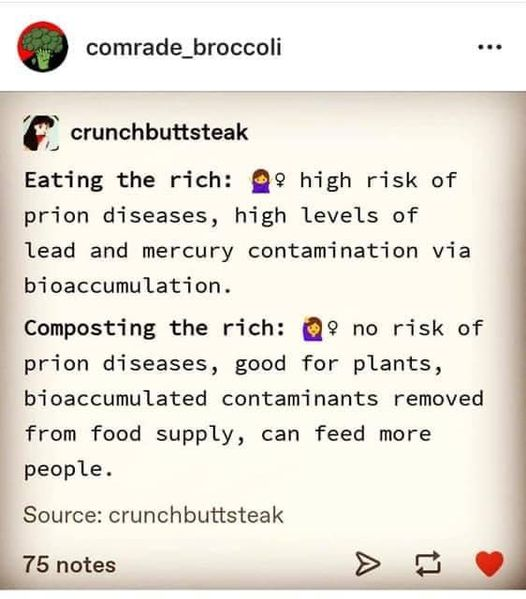this post was submitted on 19 Jul 2024
896 points (97.5% liked)
Science Memes
10950 readers
2011 users here now
Welcome to c/science_memes @ Mander.xyz!
A place for majestic STEMLORD peacocking, as well as memes about the realities of working in a lab.

Rules
- Don't throw mud. Behave like an intellectual and remember the human.
- Keep it rooted (on topic).
- No spam.
- Infographics welcome, get schooled.
This is a science community. We use the Dawkins definition of meme.
Research Committee
Other Mander Communities
Science and Research
Biology and Life Sciences
- !abiogenesis@mander.xyz
- !animal-behavior@mander.xyz
- !anthropology@mander.xyz
- !arachnology@mander.xyz
- !balconygardening@slrpnk.net
- !biodiversity@mander.xyz
- !biology@mander.xyz
- !biophysics@mander.xyz
- !botany@mander.xyz
- !ecology@mander.xyz
- !entomology@mander.xyz
- !fermentation@mander.xyz
- !herpetology@mander.xyz
- !houseplants@mander.xyz
- !medicine@mander.xyz
- !microscopy@mander.xyz
- !mycology@mander.xyz
- !nudibranchs@mander.xyz
- !nutrition@mander.xyz
- !palaeoecology@mander.xyz
- !palaeontology@mander.xyz
- !photosynthesis@mander.xyz
- !plantid@mander.xyz
- !plants@mander.xyz
- !reptiles and amphibians@mander.xyz
Physical Sciences
- !astronomy@mander.xyz
- !chemistry@mander.xyz
- !earthscience@mander.xyz
- !geography@mander.xyz
- !geospatial@mander.xyz
- !nuclear@mander.xyz
- !physics@mander.xyz
- !quantum-computing@mander.xyz
- !spectroscopy@mander.xyz
Humanities and Social Sciences
Practical and Applied Sciences
- !exercise-and sports-science@mander.xyz
- !gardening@mander.xyz
- !self sufficiency@mander.xyz
- !soilscience@slrpnk.net
- !terrariums@mander.xyz
- !timelapse@mander.xyz
Memes
Miscellaneous
founded 2 years ago
MODERATORS
you are viewing a single comment's thread
view the rest of the comments
view the rest of the comments

also doesn't remove prion diseases
Not that I disagree with you, but it doesn't make sense that they are stable in soil given that they are proteins, and those are relatively quickly decomposing in soil.
(Don't) Ask me how I know.
Prions are quite stable, and also they don't need to stay in the soil for long, just enough to get reconsumed. Supposedly that's how CWD (chronic wasting disease, not coarse woody debris), is spread among deer.
Edit: in context with composting, overall temps would be higher in such a pit but not by much. Its anywhere from room temp to 140F/60C. Prion destruction is a lot higher temp wise. As for bacteria in the pile, maybe? It might be more likely to become meaningfully degraded in a compost pile instead of normal soil.
As for cwd prion bio accumulation, it's been hypothesized but not demonstrated (like grass picking it up from the soil itself). It's spread in saliva and indirectly from the environment which is probably why you shouldn't feed deer in areas with cwd and explains a lot of the spread. Also apparently the scrapie prion can endure for 16 years. Wtf.
How do you know the acronym CWD -> coarse woody debris? That's not one most people are aware of
I'm an ecology major and that came up a lot in the papers I read. It largely shows up in forest ecology papers, which should have an overlap with chronic wasting disease, considering that deer populations have had this for a while and deer play a huge role in forest ecology.
First time my senior seminar class encountered it in an assigned paper, we all asked why that particular acronym.
It's been largely a meme in that seminar class as a result.
That's amazing. as you can probably guess, my background is in reclamation, so we use CWD a lot to create microsites, and control the speed of water across the landscape
That's super cool. What would be the impact of the CWD with controlling the speed of water on the surroundings? Id assume probably erosion reduction would be the goal?
Yes, exactly. On moderate slopes it works great.
a quick look at wikipedia will show you are wrong
"In 2015, researchers at The University of Texas Health Science Center at Houston found that plants can be a vector for prions. When researchers fed hamsters grass that grew on ground where a deer that died with chronic wasting disease (CWD) was buried, the hamsters became ill with CWD, suggesting that prions can bind to plants, which then take them up into the leaf and stem structure, where they can be eaten by herbivores, thus completing the cycle. It is thus possible that there is a progressively accumulating number of prions in the environment."
I said I don't see how (mechanism). I'm not wrong about proteins breaking down fast in soil